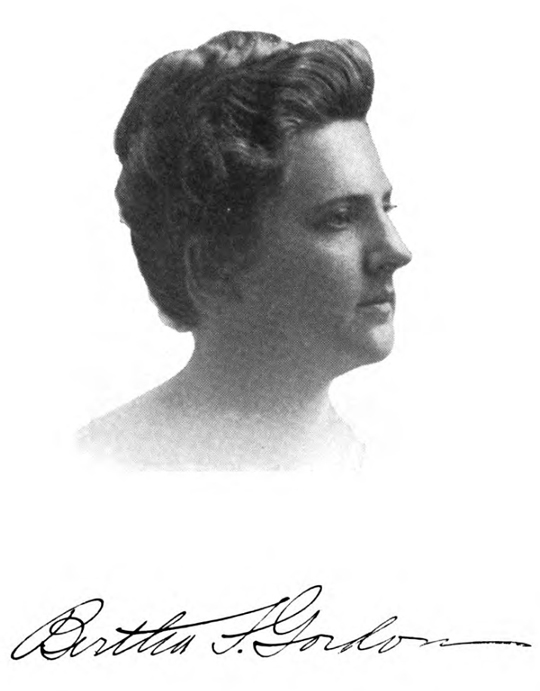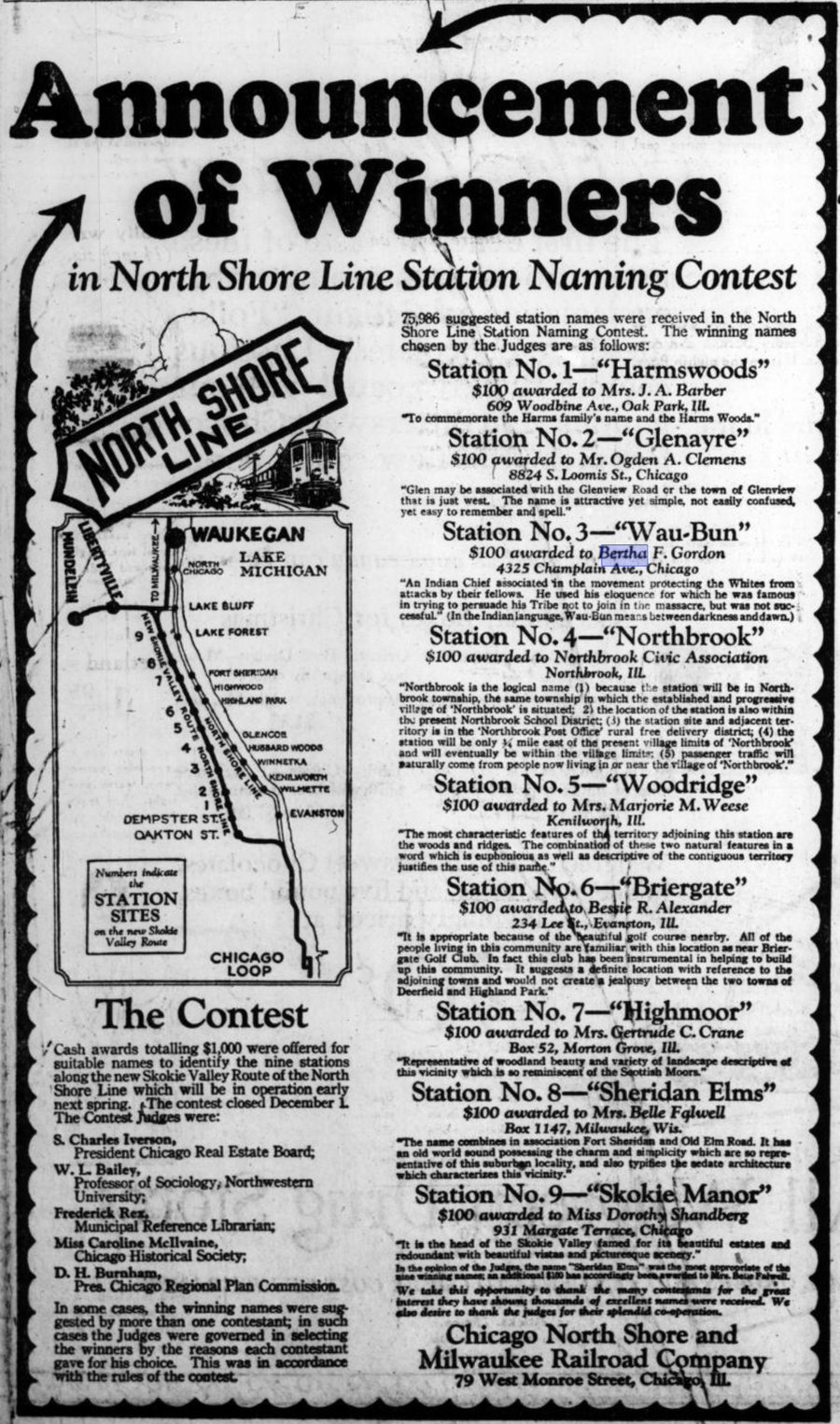Bertha F. Gordon, writings by and about
This page is a bibliographic meander from the “still still water” compilation (and derivations therefrom) at 2633. Bertha F. Gordon (1879-? ) — musician and composer, poet, instructor of manual arts, writer — required to be taken out of obscurity.
writings by writings (in progress) “To a Violin” Strange shape, who molded first thy dainty shell ? also in Songs of Courage (1911) : 27 : link
reviewed in Fuel (“A Weekly Journal Devoted to Coal, Coke & Kindred Industries”) 16:12 (January 17, 1911) : 422 : link
frontispiece to Songs of Courage, and Other Poems (1911)
“Reason and the Rose” (pages 65-70) : link — Persons. Station No. 3 — “Wau-Bun” Chicago Daily Tribune (December 19, 1925) : 10 : link (archive.org)
the book is discussed by Harold Goldwhite (Cal State Los Angeles), “This Month in Chemical History,” in SCALACS (“A joint publication of the Southern California, Orange County and San Gorgonio sections of the American Chemical Society” 64:1 (January-February 2011) : 8-9 : link We can learn a lot from old science textbooks; of course they tell us about the received truths of the science at the time the book was published — but that isn’t the point I want to make in this sketch. We may in fact be induced to re-examine the way we teach science by the example of some of these old books. other publications, listed at LoC —
about
![]()
quoted (with approval) entire in a discussion of a “collection of sonnets, which are in the Chap-Book’s possession, written by the pupils of the Hyde Park High School,” in the column “Notes.”
The Chap-Book 6:11 (April 15, 1897) : 422 : link
Who carved these melting curves? Who first did bring
Across thy latticed bridge the slender string?
Who formed this magic wand to weave the spell,
And, lending thee his own soul, bade thee tell,
When o’er the quiv’ring strings he drew the bow,
Life’s history of happiness and woe,
Or sing a paean, or a funeral knell?
Oh, come, belov’d, responsive instrument,
Across thy slender throat with gentle care
I'll stretch my heart-strings; and be quite content
To lose them, if with man I can but share
The springs of song that in my heart are pent,
To quench his thirst and help his load to bear.

New York, The Baker & Taylor co., 1911.
NYPL copy/scan (via hathitrust) : link
a verse drama; interesting set-up :
The Old Mathematician.
The Young Poet.
Place.
The Library-study shared by the Old Mathematician and the Young Poet.
Time.
Early evening of a Summer’s Day.
Cornell copy/scan (via google books) : link
$100 awarded to Bertha F. Gordon
4325 Champlain Ave., Chicago
“An Indian Chief associated in the movement protecting the Whites from attacks by their fellows. He used his eloquence for which he was famous in trying to persuade his Tribe not to join in the massacre, but was not successful.” (In the Indian language, Wau-Bun means between darkness and dawn.)
(one of nine awards, for naming nine stations.)

Dansville, N.Y., F. A. Owen publishing company [c1928]
U Wisconsin - Madison copy/scan (via hathitrust) : link
(and elsewhere)
(pdf, scroll down), from which —
These reflections are prompted by some of the contents of a colleague’s bookshelves. He is retiring and urged me to look at some of the older books in his collection, and one that caught my eye, and is the subject of this sketch...
[being this very volume]
Goldwhite continues,
“I wonder if there’s a connection between our warranted concerns about safety and the dwindling interest in chemistry among young people... the philosophy of having students actually do meaningful experiments as a way of learning about science is consistent with many modern approaches to teaching and learning in the sciences. Bertha F. Gordon was on to something valuable.”
![]()
Philadelphia, Dorrance and Company [c1941]
Cedar Rapids, Iowa, The Torch press [1943]
Cedar Rapids, Ia., The Torch press [1943]
note : “Prayer-like poetry” (as described by Bolerium Books, Berkeley)
![]()
about
Perhaps looking in the wrong places, or for the wrong name; not finding much. Gordon’s trajectory included Boston, Colorado and Chicago. Her father (or brother?) John was a piano tuner (source); her mother (or sister ?) Mrs. Gordon was Secretary, Chicago South Church, Woman’s Board of Missions of the Interior (source)...
This profile of Bertha Frances Gordon is taken from Gordon’s second collection of poems, Songs of Courage (1910), written by its publisher Hal W. Trovillion (1879-1967, source; archive); it is quoted in the foreword to Songs of Courage (1911), from which this transcription —
“She is not one who watches life through opera glasses from the library window; but, on the contrary, knows the world from having mixed much in its affairs. Born and reared in Boston, she was surrounded with all the intellectual advantages of that famous center of culture. The concerts of the Boston Symphony Orchestra made a profound impression upon her, and it is probably because of that musical influence that she is to-day a musician and composer. Indeed her chief claim to distinction lies in her music rather than in her poetry...
It must have been something of a plunge for her to be taken out of this refined world and set down amid the mining camps and cattle ranches of the Rockies. Yet here she spent two of the happiest years of her life. The primeval immensity, the varied voices, but above all the silence of the wilds, made a potent appeal to her tensely strung nature.
After her sojourn in Colorado, whe came to live (and lives to-day) in Chicago. Here she earns her bread by the chisel and the hammer, being a teacher of Manual Training. For side by side with the artistic leanings, there dwells in her nature a strong mechanical bent — a turn for the pre-eminently practical; so that she is an example of the present idea of the balanced woman — one with athletic muscles, a trained, practical mind, and a soul keenly appreciative of the artistic.”
source
20240627